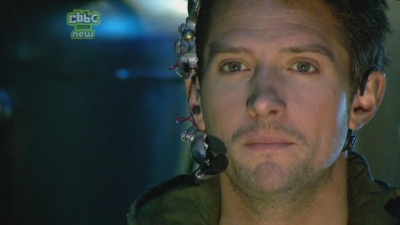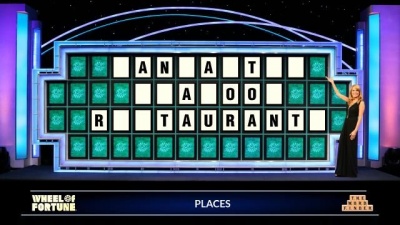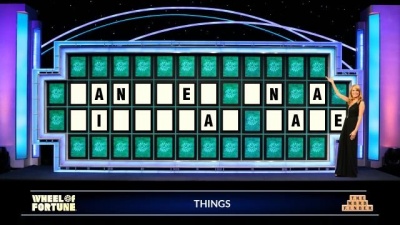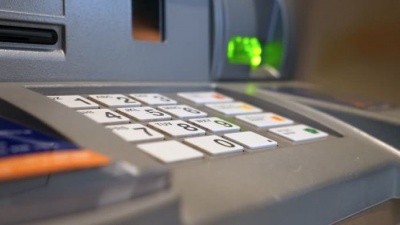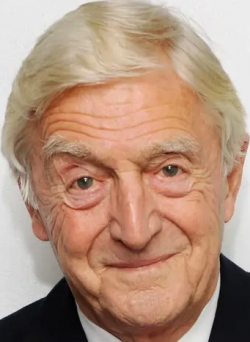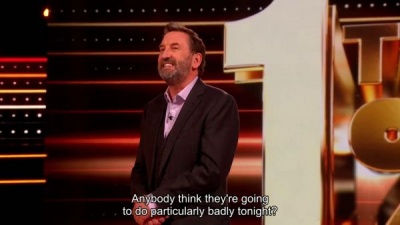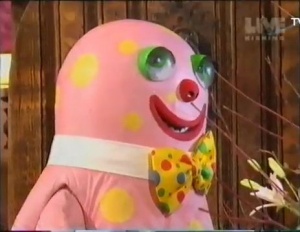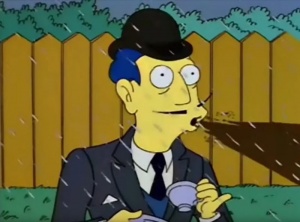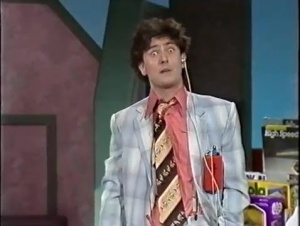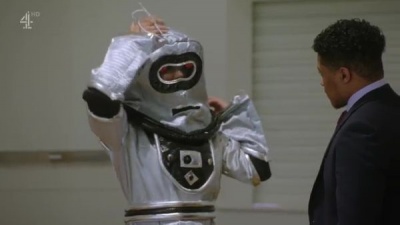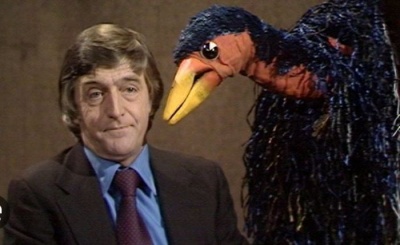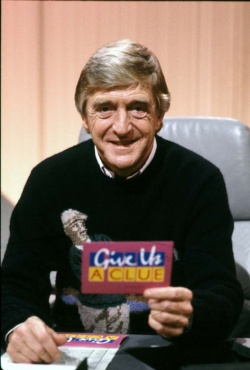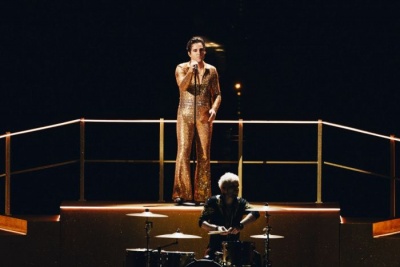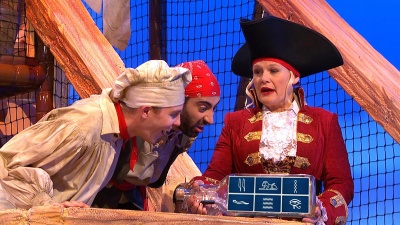Weaver's Week 2023-08-20
(Created page with 'Last week | Weaver's Week Index | Next week <div class=image> [[File:Mission 2110 caleb closeup.jpg|4…')
Current revision as of 11:02, 20 August 2023
Last week | Weaver's Week Index | Next week
"I am Caleb. Not entirely man, but human enough."
Contents |
Can Artificial Intelligence win a game show yet?
Last week, we tried to see what an autocomplete bot can and cannot do in the world of game shows. It's great at general knowledge quizzes, cannot grasp the basic rules of Countdown, and might score a couple of points on a Connecting Wall by banging enough buttons to luck on a group.
After smashing up the set when the autocomplete bot didn't know 100 + 5 = 105, Colin Murray set the bot a challenge: prove it wasn't too thick to go on Wheel of Fortune. We're using real puzzles from the American show, originally set in late 2019.
You may not replace a dash with any of u, t, o, z, g, a, x, n, j, p, r. You may replace different dashes with the same letter.
Each sequence of dashes and letters makes one word, and the whole sequence of words makes a phrase that can be described as "places".
What is the phrase? Explain your working.That's as maybe, but it doesn't fit the grid. FANTASTIC SEAFOOD RESTAURANTS, the answer we were rather hoping for.
We tried again, with
Don't burn your mouth with CANDLES ON A BIRTHDAY CAKE the model answer.
Colin was right, the autocomplete bot is too thick for Wheel of Fortune.
How does this "artificial intelligence" brain really work?
Autocomplete bots don't actually have a brain, they're made by taking in lots and lots and lots of sentences of real text, and working out some of the most likely ways to complete the sentence so that it appears to form a genuine thought. Or, as we've seen, to state the blindingly obvious and hope that it'll fool a tired Second Form teacher.
So let's try and find out how the autocomplete bot's non-existent brain really works, by asking some questions from The 1% Club. Being very generous and wanting to pad out the column just a bit further, we'll let it pay for one wrong answer.
Ding ding ding ding ding! It's the right answer! Bad news to the four flesh-and-blood humans who didn't get this in Australia earlier in the year, you are officially thicker than an autocomplete bot. Never mind, you can always go on Wheel of Fortune.... oh.
Good grief, we got there eventually.
A) 5224
B) 9161
C) 6017
D) 4033
To meet the requirements, we need two digits to be the same, which is satisfied by the two 2's in the PIN. Next, we need all four digits to add up to an even number. We can check this by adding up the digits in each option:
A) 5 + 2 + 2 + 4 = 13 (an odd number)
B) 9 + 1 + 6 + 1 = 17 (an odd number)
C) 6 + 0 + 1 + 7 = 14 (an even number)
D) 4 + 0 + 3 + 3 = 10 (an even number)
What an apt way to lose your thousand pounds. As you'll have got at home, D is the answer.
(Humans will already know "White" is the answer, as you're back on the same square you started.)
"Moving horizontally does not change the colour"?! Never mind how the autocomplete bots are incapable of getting to the first ad break, the autocomplete bots are not to be trusted on a zebra crossing.
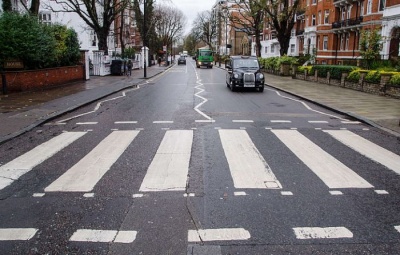 We said we'd take the autocomplete bot's picture at Abbey Road. We went to the famous one near Hampstead. It went to the one near West Ham.
We said we'd take the autocomplete bot's picture at Abbey Road. We went to the famous one near Hampstead. It went to the one near West Ham.
So these "artificial intelligence" thingies don't have a brain. How do they work?
So far, we've seen that autocomplete bots are rubbish at The 1% Club and Countdown, brilliant at general knowledge, would spin the Wheel of Fortune the wrong way, and the only thing they'll do to a Connecting Wall is run into it then wonder why their teeth hurt.
Here's why they're rubbish at inventive tests. Autocomplete bots are – basically – trying to provide a "probable continuation" of what it's written so far. And that's "probable" in the sense of "based on what you've found from working with billions and billions of lines of text, what's likely to come next?"
The autocomplete bot looks into its database for sentences that match the meaning of what it's written. It comes up with a list of possible continuations, and picks one of the most probable answers at the right probability.
For instance, if an autocomplete bot wrote "The best game show host is", it might continue with probabilities:
- Bob – 6%
- Nicholas – 5.2%
- Richard – 4.8%
- Victoria – 4.4%
- Michael – 3.7%
- Alex – 2.2%
- Jeremy – 1.2%
Our autocomplete bot rolls some electronic dice, and picks "Michael". And it continues, "The best game show host is Michael"
- Barrymore – 11%
- Jackson – 9.4%
- Aspel – 7.6%
- Underwood – 5.1%
- Parkinson – 4.6%
- Owen – 3.8%
And that's the problem with autocomplete bots. Lots of people say Michael Jackson was the best person ever, lots of people talk about game show hosts called Michael, but we humans know it's nonsense to say "The best game show host is Michael Jackson."
How does the autocomplete bot know what the sentence is about? From reading a lot, and finding that when we're talking about "game show host", we're talking about people who are the hosts of game shows, and not about show hosts who are game. That said, we are surprised they've not yet had a box of Cluedo host Have I Got News for You.
(For a much fuller explanation of what autocomplete bots do, we recommend Stephen Wolfram's explanation )
This explains why autocomplete bots are good at University Challenge, and bad at all the other tasks we've set them. University Challenge takes existing information, already held in the bots' capacious memory banks, and repeats it back to us.
Only Connect, The 1% Club, even Countdown and cryptic crosswords – they all require a novel interpretation of information. The bot can't just look into its memory banks, it needs to do something else. It literally needs to think outside the box. Take the Only Connect walls we saw last week, "Peke" isn't usually a breed of dog, "Penzance" is so rarely used as a word in a Gilbert & Sullivan title. Humans can spot these unusual links; bots cannot.
Does an autocomplete bot have a personality?
Let's stick a fake moustache on the autocomplete bot and sneak it into the Fighting Talk studio while Colin's away. How can it cope with the endgame, "Defend the Indefensible".
The power of "On My Cart and Horses" lies in its beautifully crafted lyrics. Snipton's poetic genius shines through as he weaves a tale of resilience, determination, and the pursuit of dreams. The lyrics paint vivid imagery, transporting listeners to a world where carts and horses symbolize the journey of life. With each verse, Snipton's words evoke emotions, inspiring us to embrace our own aspirations and overcome obstacles that stand in our way.
Beyond its lyrical prowess, the melody of "On My Cart and Horses" is nothing short of enchanting. Snipton's ability to blend various musical elements seamlessly creates a harmonious symphony that resonates with the soul. The catchy hooks and infectious rhythm make it impossible to resist tapping your feet or humming along. This timeless melody has the power to transport us to a place of pure joy and nostalgia, making it a true masterpiece.
The impact of "On My Cart and Horses" extends far beyond its initial release. This single has left an indelible mark on the music industry, inspiring countless artists and shaping the landscape of popular music. Its influence can be heard in the works of subsequent generations, as artists continue to draw inspiration from Snipton's innovative style and lyrical depth. The legacy of this song is a testament to its greatness and its enduring impact on the world of music.[serrrrrrrrrrrNIP!]
"Vivid imagery"? "Harmonious symphony"? "Inspired countless artists"? "Snipton's poetic genius"? Admit it, autocomplete bot, you're not familiar with this song. You've never heard it, you've never scanned the sheet music, never ingested the lyric. Nobody is familiar with this song, because it doesn't exist.
All the autocomplete bot can do is come up with some vapid platitudes, likely ways of saying a song is great without understanding art in any way. Or even checking to see that it is real art, and not invented by a bunch of bored Smash Hits writers who had had a bit too much rock 'n' roll mouthwash.
While we're really taking the silly
Seeing as how we prepared a whole episode's worth of suitable questions, let's go back to The 1% Club, and here's a 1% question
VCCCVCCCVCCCCCVCCCCCVCCCCC
Explain your answerWhat? What? The blimmin thing's only gone and got a 1% question right!
This was a guess, right? Tell us this was a lucky, fluky, stopped-clock-is-right-twice-a-day guess.
Let's try a 5% question.
Phew!
In conclusion
What have we learned over the past fortnight?
Autocomplete bots are able to regurgitate information fed to them, but cannot make anything creative, or argue outside of their comfort zone. They can make a superficially convincing case for something, but it doesn't hold water when you look at it in any detail.
Autocomplete bots don't admit they make mistakes, they hide their lack of knowledge with bluster and bravado and a pervasive arrogance. And if you ask them, autocomplete bots will talk on any subject, even stuff we've made up on the spot.
All of these are essential qualities on a genre of game show: the social climbing programme. Autocomplete bots ought to apply for The Apprentice. Autocomplete bots would be very good on Make Me Prime Minister.
Michael Parkinson
Michael Parkinson has died, aged 88. His chat show Parkinson defined the genre for generations of viewers. It ran from 1971 until 2007, and we saw Parky talk to star guests like Mohammed Ali, Fred Astaire, David Bowie, Ingrid Bergmann, and Rod Hull with the hyper-aggressive puppet Emu.
"Parky" brought star power to television screens: he always remembered to be a bit star-struck, couldn't quite believe that he was rubbing shoulders with some of the greatest names in the world. Parky was always friendly, charming; like his TV-am colleague David Frost, Parky knew that you attract the best revelations with honey rather than vinegar. And, like all the best chat shows, the stars were the guests – Parky was overshadowed almost every week.
Born in 1935, the only child of Jack and Freda, Michael Parkinson grew up in a coal-mining village near Barnsley. Deterred from following his father down the coal mines, and not good enough to play cricket for Yorkshire, Parky moved into journalism – Barnsley Chronicle, Yorkshire Evening Post, Manchsester Grauniad, Daily Express; and television work with ABC in Didsbury, Granada, and BBC current affairs programme 24 Hours.
He hosted Parkinson on BBC1 from 1971 until 1982, when he left for breakfast television's TV-am. Ousted from the troubled station after eighteen months as the weekend host, Parkinson went back to radio – a show rootling around in the archives, then host of Desert Island Discs on Radio 4, some work for LBC Newstalk, a weekend entertainment on Radio 2, and sports programmes on Radio 5.
He also did some game shows. Where in the World (1971) had brought him to the BBC. All Star Secrets (1985-6) asked celebrities to reveal their secret passions. He took over Give Us a Clue for much of the 1980s, and antiques show Going for a Song in the late 90s. He had a memorable turn on the reality drama Ghostwatch, and helmsed 2000 Today the BBC's coverage of the millennium. Parkinson returned to BBC1 in 1998, moving to ITV in 2004, from where Parky retired three years later. Michael Parkinson leaves a widow, Mary, and three sons.
In other news
How much does good television cost? From time to time, we try to work out how much (or how little) popular television shows cost. Only Connect is the domestic winner, 2.5 million viewers on about £50,000 (€ 55.000) per half-hour episode.
Eurovision Song Contest is the international champion, and RTÉ has confirmed exactly how much it spends on the programmes. The whole delegation cost this year was € 340.000, which included € 58.129 on staging and a participation fee of € 105.099. For this spend, the broadcaster got just under nine hours of prime-time entertainment. These figures don't account for the national final.
Our back-of-an-envelope calculation says that the BBC probably spends no more than £800,000 to enter the contest and stage its song. In a normal year (ie not when they're hosting it), the BBC gets an average of 4 million viewers at £90,000 an hour.
More Riddiculous?! ITV has confirmed a second series of Riddiculous, the Ranvir Singh / Henry Lewis show with quizzes and riddles. Another five weeks of episodes will air at the start of next year. We're looking forward to it: the first series had the spark of something excellent.
Quizzy Monday
A decisive wall on Only Connect where the Isotopes came from behind to beat the Academicals 22-17. The teachers from Sussex had moved ahead in Sequences, through knowledge of deer and the Lego logo, but came completely unstuck against the wall. The Isotopes (named after the baseball team in The Simpsons had a good wall, and an excellent Missing Vowels round where they paid tribute to Swashbuckle's Cook, Line, and Sinker.
University Challenge had a one-sided match, Emmanuel Cambridge beat Jesus Oxford by 240-60. Alexander Harrison was excellent on the buzzer, picking up nine starters. The team picked up on clues – scientists whose names begin "van der", mathematicians beginning "K".
A couple of sharp – but fair – adjudications. In a question about classical music, "Viennese school" was not accepted for "Second Viennese school" – the atonal composers like Schoenberg and Webern are distinguished from the "First Viennese School" of Mozart and Haydn and other contemporaries of Paxman. The question had asked for a three-word title, we assume "New Viennese School" would have been allowed. A little later, "Fourier expansion" and "Fourier analysis" were not accepted for "Fourier transform"; the question had mentioned the Cooley-Tukey algorithm, who took the credit for Gauss's work centuries earlier. Would be nice if someone had clarified either of these points on the programme.
Quiz digest
Three from BBC Brain.
- Jane, June, Julia, Jennifer and Joanna were the stars of Absolutely Fabulous, the BBC's 1990s sitcom. File them alongside Joey Jeffy and Jamie from Daria; and Joseph Joseph Joe and James of 1950s vocal group The Four J's.
- Charles Darwin was born on the same day as Abraham Lincoln. Other shared birthdates include Lyndon Johnson and the cricketer Don Bradman; also George Bush Junior and Sylvester Stallone.
- There is a float-through McDougals in Hamburg harbour. Tom Scott has been there.
A new series for daytime, The Finish Line (BBC1, weekdays) with Roman Kemp and Sarah Greene. Never Mind the Buzzcocks returns to The Satellite Channel Or Whatever They're Calling It This Week (Wed). If you've missed Popmaster on More4, repeats are coming to Channel 4 (Fri).
We don't expect to publish next week, so here's the sneak peak for 28 August. Mystic Mug sees a black chair, and a nice man asking some questions. There are falling coins, and people chasing each other tooooooo.
We'll be back on 3 September, Ultimate Wedding Planner is in our sights.
Pictures: BBC, The Word Finder, Magnum Media in association with Silver Star, Twofour and Accidentally On Purpose in association with Motion Content Group, Thames, EBU/BBC, BBC Childrens' and Families.
To have Weaver's Week emailed to you on publication day, receive our exclusive TV roundup of the game shows in the week ahead, and chat to other ukgameshows.com readers, sign up to our Google Group.

